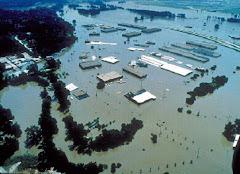By Robert F Allison
One major problem in the debate over climate change is a general lack of knowledge on the subject. People usually don't think about where their electricity, gasoline, or toilet paper comes from. Part of this acceptance comes from the way industry separates products from the production process...When we turn on lights in L.A., we don't see the plants and coal mines that generated the power...Only those paying careful attention make the connections. Another part of the problem is that we are reluctant to question science, which has such prestige that people rarely stop to question who is funding research and whether that could compromise findings. (Gibson 17)
Most people also don't understand how the theory of global warming works. They think that a really cold winter is evidence that global warming is a myth. However, scientists that support the ideas of global warming are referring to long-term climate change. Climate refers to environmental patterns over a long period of time. Weather refers to short-lived events, and can have isolated extremes. One of the predictions of many scientists is that global warming will cause more extreme weather: hotter summers, longer droughts, colder winters, and stronger storms. According to their theories, Europe could be tossed into another ice age because of global warming, not turned into a tropical paradise. This is because of the effect global warming could have on ocean currents.
Skeptics will often find any opportunity to attack the views of scientists based on some isolated weather event, or the lack of such an event. If the scientists predict increasing frequency and intensity of hurricanes, skeptics will point out that this last hurricane season was extremely mild, with the only intense storms hitting Mexico. Ultra-conservative commentator, Rush Limbaugh, doesn't just consider global warming to be a myth; he calls it a hoax and a religion.
"It's got salvation, got everything in it. It has the primary ingredient of every religion: faith. Because none of it can be proved" (Limbaugh 4). Limbaugh also takes issue with the use of the word "consensus" by global warming activists, and is right to do so. "Consensus and science-I got blue in the face saying this-don't and cannot mutually co-exist" (Limbaugh 4). If scientists had reached any sort of consensus, this would be a dead issue. Most scientists agree that the temperature of the earth has been gradually increasing, but that doesn't mean they agree on the possible causes or consequences.
A survey of more than 530 climate scientists from 27 different countries showed that 82% of the scientists agreed that global warming is occurring. Only 2.6% said they "strongly disagree." When asked if current scientific knowledge can allow for a reasonable assessment of greenhouse gases, two-thirds of the scientists disagreed with the statement.
The question most people are most keen to ask climate scientists is probably "do you agree or disagree that climate change is mostly the result of anthropogenic (man-made) causes?" Slightly more than half (55.8%) of climate scientists surveyed agreed, 14.2% were unsure, and 30% disagreed. Interestingly, more scientists "strongly disagree" than "strongly agree" that climate change is mostly the result of anthropogenic causes. The survey clearly shows that the debate over why the climate is changing is still underway, with nearly half of climate scientists disagreeing with what is often claimed to be the "consensus" view. (Bast 4)
The study goes on to clarify that the question wasn't whether humans have any effect on climate, but whether they are mostly to blame. It's certainly quite possible that humans are having at least some effect on the climate, but nothing can be proven with any certainty.
Some skeptics believe that mankind is too insignificant and could not possibly have so much influence on the environment. S. Fred Singer is a well-known climate change skeptic. He has been trying to gain support for the theory that climate change is a natural, cyclical process. He believes the earth has a 1,500-year cycle of warming and cooling, with minor ice ages interspersed with interglacial periods. Singer claims that his research shows this cycle going back at least one million years, often with abrupt changes. At one time, Greenland was quite green, with crops and livestock farming. Warm waters were abundant with fish and seals. There were two thriving settlements, but they were eventually lost to glaciers, malnutrition, and starvation.
Dairy farmers were even forced to eat their cows. This was due to a 1.5 degree Celsius drop in average temperatures between 1100 and 1400. "Denmark would not re-colonize Greenland until 1721, when the Little Ice Age was losing its grip on the huge island. Today, 150 years into the Modern Warming, Greenland has 50,000 people" (Singer xii). Singer believes that these cycles are caused by solar changes, not greenhouse gases. He is skeptical of activists who "ask society to renounce most of its use of fossil fuel-generated energy and accept radical reductions in standards of living to "save the planet" (Singer 3). While it makes sense to not be swept up in the alarmist propaganda of activists, being unwilling to sacrifice an air conditioner or SUV, if it is truly necessary, seems selfish and defiant.


